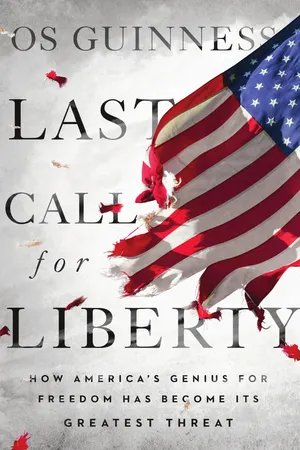
Last Call for Liberty
How America's Genius for Freedom Has Become Its Greatest Threat
- 336 pages
- English
- ePUB (mobile friendly)
- Available on iOS & Android
About This Book
Logos Bookstore Association AwardWorld Magazine Book of the YearThe hour is critical. The American republic is suffering its gravest crisis since the Civil War. Conflicts, hostility, and incivility now threaten to tear the country apart. Competing visions have led to a dangerous moment of cultural self-destruction. This is no longer politics as usual, but an era of political warfare where our enemies are not foreign adversaries, but our fellow citizens.Yet the roots of the crisis are deeper than many realize. Os Guinness argues that we face a fundamental crisis of freedom, as America's genius for freedom has become her Achilles' heel. Our society's conflicts are rooted in two rival views of freedom, one embodied in "1776" and the ideals of the American Revolution, and the other in "1789" and the ideals of the French Revolution. Once again America has become a house divided, and Americans must make up their minds as to which freedom to follow. Will the constitutional republic be restored or replaced?This grand treatment of history, civics, and ethics in the Jewish and Christian traditions represents Guinness's definitive exploration of the prospects for human freedom today. He calls for a national conversation on the nature of freedom, and poses key questions for concerned citizens to consider as we face a critical chapter in the American story. He offers readers a checklist by which they can assess the character and consequences of the freedoms they are choosing.In the tradition of Alexis de Tocqueville, Guinness provides a visitor's careful observation of the American experiment. Discover here a stirring vision for faithful citizenship and renewed responsibility for not only the nation but also the watching world.
Frequently asked questions
Information
NOTES
Introduction
Question One: Do You Know Where Your Freedom Came From?
Table of contents
- Cover
- Title Page
- Dedication Page
- Contents
- INTRODUCTION: A New, New Birth of Freedom?
- QUESTION ONE: Do You Know Where Your Freedom Came From?
- QUESTION TWO: Are There Enough Americans Who Care About Freedom?
- QUESTION THREE: What Do You Mean by Freedom?
- QUESTION FOUR: Have You Faced Up to the Central Paradox of Freedom?
- QUESTION FIVE: How Do You Plan to Sustain Freedom?
- QUESTION SIX: How Will You Make the World Safe for Diversity?
- QUESTION SEVEN: How Do You Justify Your Vision of a Free and Open Society?
- QUESTION EIGHT: Where Do You Ground Your Faith in Human Freedom?
- QUESTION NINE: Are You Vigilant About the Institutions Crucial to Freedom? A Republic or a Democracy?
- QUESTION TEN: Are You Vigilant About the Ideas Crucial to Freedom? Which Revolution Do They Serve?
- CONCLUSION: America’s Choice: Covenant, Chaos, or Control?
- ACKNOWLEDGMENTS
- NOTES
- NAME INDEX
- SUBJECT INDEX
- ALSO BY OS GUINNESS
- PRAISE FOR LAST CALL FOR LIBERTY
- ABOUT THE AUTHOR
- MORE TITLES FROM INTERVARSITY PRESS
- Copyright